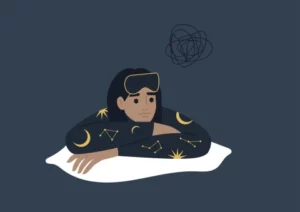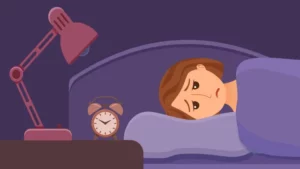Anxiety and sleeping problems often go hand-in-hand. In fact, up to 50% of people who suffer from anxiety also have difficulty sleeping. This can be a vicious circle, as poor sleep can make anxiety worse, and anxiety can keep you from getting a good night’s sleep. In this blog post, we will explore the relationship between anxiety and sleeping problems, and discuss some of the causes and solutions.
Contents
Defining Anxiety
 We are no strangers to anxiety. We feel it when we have a big test coming up, or when we are about to give a presentation. It is that feeling of dread, worry, and nervousness. But for some people, anxiety is more than just an occasional feeling. It is a chronic condition that can interfere with everyday life.
We are no strangers to anxiety. We feel it when we have a big test coming up, or when we are about to give a presentation. It is that feeling of dread, worry, and nervousness. But for some people, anxiety is more than just an occasional feeling. It is a chronic condition that can interfere with everyday life.
Anxiety becomes problematic when it is out of proportion to the situation, or when it occurs without any obvious trigger. It can cause physical symptoms such as a racing heart, sweating, and difficulty breathing. It can also lead to sleeping problems, as well as fatigue and irritability during the day.
There are many different causes of anxiety. For some people, it may be due to a chemical imbalance in the brain. Others may have experienced traumatic events that trigger anxiety. And for some people, anxiety may run in the family.
Relationship Between Anxiety and Sleeping Problems
As we already know now, anxiety is often accompanied by sleeping problems. This can be due to the physical symptoms of anxiety, such as a racing heart and difficulty breathing. But it can also be due to the worry and stress that comes with anxiety. When you are worrying about things, it is hard to relax and fall asleep.
There are a few different ways that anxiety can cause sleeping problems.

- First, anxiety can make it hard to fall asleep in the first place. This is because your mind is racing and you cannot turn off your thoughts.
- Second, anxiety can cause you to wake up during the night. This may be due to the physical symptoms of anxiety, or because you are having anxious thoughts.
- Third, anxiety can cause you to wake up early in the morning. This is often called “anxiety arousal” and it can make it hard to get back to sleep.
- Moreover, REM sleep, which is the most crucial part of deep sleep, is also disrupted by anxiety. This can result in further issues such as daytime fatigue, which only exacerbates the cycle of anxiety and sleeping problems.
- There is also a relationship between anxiety and sleeping problems through the stress-response system. The stress-response system is a complex set of interactions between the brain, endocrine, and immune systems that helps the body respond to stressful situations. When you experience anxiety, your body goes into fight-or-flight mode, which can lead to sleep problems.
These are all the possible ways anxiety can affect your sleep. As you can see, it is a complex issue with many different causes. In the next section, we will discuss some solutions to this problem.
Types Of Sleeping Problems Caused By Anxiety
Sleeping problems are of various types. These include difficulty falling asleep, waking up during the night, and waking up early in the morning. All these signs can further lead to serious sleeping problems. The first thought when we think of sleeping issues is insomnia. While it is a very obvious one, there are many more types of sleeping problems caused by anxiety. Let’s discuss some of them.
- Insomnia: Insomnia is the most common type of sleeping problem. It is a condition in which you have difficulty falling asleep, staying asleep, or both. It can be caused by many different things, including anxiety. When you are anxious, your mind races and it can be difficult to relax and fall asleep.
- Sleep apnea: Sleep apnea is a condition in which you stop breathing for short periods of time during sleep. It can be caused by anxiety, as well as other things. When you are anxious, your breathing may become shallow or irregular, which can lead to sleep apnea.
- Restless leg syndrome: Restless leg syndrome is a condition in which you have an urge to move your legs, especially when you are trying to sleep. It can be caused by anxiety, as well as other things. When you are anxious, your body may be in a state of fight-or-flight, which can lead to restless leg syndrome.
- Waking up during the night: This can be caused by many different things, including anxiety. When you are anxious, your body may be in a state of fight-or-flight, which can lead to you waking up during the night.
- Waking up early in the morning: This can be caused by many different things, including anxiety. When you are anxious, your mind is on a constant state of alert, which can lead to you waking up early in the morning.
- REM sleep: REM sleep is the most crucial part of deep sleep. It is a state of sleep that is characterized by rapid eye movement and dreaming. Anxiety can disrupt REM sleep, which can lead to further issues such as daytime fatigue.
As you can see, there are many different types of sleeping problems that can be caused by anxiety. In the next section, we will discuss some solutions to this problem.
Ways To Manage
Fortunately, solutions to these common issues are available, however, and with some effort and perseverance, it is possible to break the cycle and get a good night’s sleep once again. These can either be through self-help strategies, or by seeking aid of a professional.
Self Help
 Self-help is rightly considered the best and most natural form of help. After all, who knows you better than yourself? If you want to manage your anxiety and get a good night’s sleep, here are some ways to do so by yourself.
Self-help is rightly considered the best and most natural form of help. After all, who knows you better than yourself? If you want to manage your anxiety and get a good night’s sleep, here are some ways to do so by yourself.
- Talk to someone: Talking to someone about your anxiety can be very helpful. It can help you understand your anxiety and learn ways to cope with it.
- Keep a journal: Keeping a journal can help you track your anxiety and see how it affects your sleep. It can also help you find patterns and triggers for your anxiety.
- Exercise: Exercise can help reduce stress and improve sleep. It is important to exercise during the day, not just before bed.
- Relaxation techniques: There are many different relaxation techniques that can be helpful for managing anxiety. Some of these include yoga, meditation, and deep breathing exercises.
- Create a bedtime routine: Having a bedtime routine can help you wind down and prepare for sleep. This can include things like taking a warm bath, reading, or listening to calm music.
- Avoid caffeine and alcohol: Caffeine can make anxiety worse and make it harder to sleep. It is best to avoid caffeine late in the day. Alcohol also disrupts sleep and can make anxiety worse.
- Cut off screen time: Using electronics before bed can make it harder to sleep. The blue light from screens can disrupt the body’s natural sleep cycle. It is best to avoid any device usage before sleeping.
All of these are some of the many ways that you can help manage your anxiety and get a good night’s sleep. While it may take some time to find what works for you, it is important to be patient and persistent.
Professional Treatment
If self-help strategies are not working, or if your anxiety is severe, you may need to seek professional help. There are many different types of treatment available for anxiety, and a professional can help you find the best one for you.
Therapy: Therapy focuses on talking and discussing your anxiety. It can help you understand your anxiety and learn ways to cope with it. Some of the most common therapy types for anxiety and/or sleep issues include:
- cognitive-behavioral therapy (CBT)
- acceptance and Commitment Therapy (ACT)
- exposure therapy
- clinical hypnosis
- narrative therapy
- expressive art therapy
Medication: Medication can be used to treat both anxiety and sleep problems. They work by changing the way the brain works and can help to reduce symptoms. Some of the most common medications used for anxiety and sleep include:
- selective serotonin reuptake inhibitors (SSRIs)
- serotonin and norepinephrine reuptake inhibitors (SNRIs)
- benzodiazepines
- tricyclic antidepressants (TCAs)
- monoamine oxidase inhibitors (MAOIs)
- sleep medications
There are many different types of medication available, so it is important to speak with a professional about what would be best for you.
Alternative approaches: There are also a lot of alternative approaches that can be helpful for anxiety and sleep. Some of these include:
- acupuncture
- massage
- aromatherapy
- herbal supplements
- relaxation techniques
- yoga
Some of these may be more effective than others, so it is important to speak with a professional about what would be best for you.
All of these are some of the many options that are available for treating anxiety and sleep problems. If self-help strategies are not working, seek professional help to find the best treatment for you.
Conclusion
To conclude, we can affirm that anxiety and sleep problems are closely related. Anxiety can cause sleeping problems, and sleeping problems can cause anxiety. However, there are many ways to manage both anxiety and sleep problems. If self-help strategies are not working, seek professional help to find the best treatment for you.
If you or someone you know is looking for psychological help, Therapy Mantra is here for you. We are the leading providers of online therapy and counseling. Our team of highly trained and experienced therapists can provide assistance at the most affordable rates. Contact us today to learn more about our services. You may also visit our website to book an online therapy session or download our free Android or iOS app for more information.


